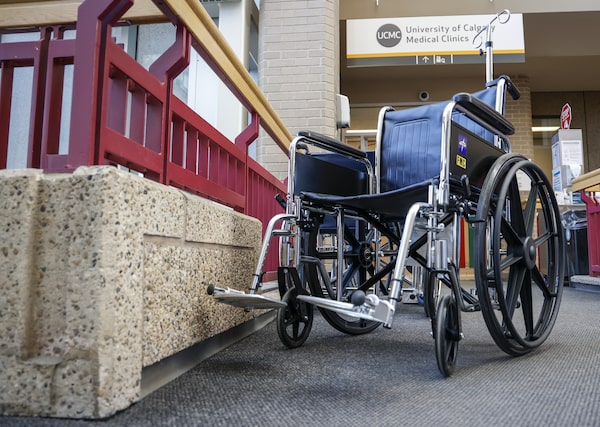
The federal budget includes proposals to change income-tax rules to allow people with guide dogs and other service animals to deduct the cost of them from tax, as well as deducting the cost for technology such as Braille displays, speech recognition devices and ergonomic work chairs.Jeff McIntosh/The Canadian Press
A new federal benefit to help people living with disabilities avoid financial hardship is being launched this year with $6.1-billion over six years, and continuing funding of $1.4-billion per year to support the program thereafter.
Around 600,000 low-income Canadians with disabilities are estimated to be eligible for up to $2,400 per year, starting from July, 2025, with the creation of the new federal benefit designed to supplement provincial support.
The disability benefit would be available to Canadians between the ages of 18 and 64 who have a valid disability tax credit certificate, which requires a doctor’s note.
The government says eligible recipients may face barriers to accessing the benefit and so it is also allocating $243-million over six years, starting this year, and $41-million per year thereafter to cover the cost of the medical forms required to apply for the disability tax credit.
Ottawa is also calling on provinces to exempt Canadian disability benefit payments from counting as income so recipients won’t face tax clawbacks.
The budget includes plans to amend income-tax rules to allow people with guide dogs and other service animals to deduct the cost of them from tax. They would also be able to deduct from their tax bill technology such as Braille displays, speech recognition devices and ergonomic work chairs.
The government is also allocating $1.5-billion over five years for the first phase of its national pharmacare program, which will provide cost-free contraception, including birth control pills and emergency contraceptives, as well as diabetes medication, including insulin.
The funds, starting in 2024-25, follow the tabling of a bill to bring in pharmacare, which was a key demand of the NDP in return for propping up the minority Liberal government until 2025.
The budget also includes $3.2-million to address shortages of essential drugs by upgrading Health Canada’s supply chain management. The move follows an outcry in 2022 and 2023 over shortages of children’s pain medications and baby formula.
The budget includes proposals to amend the Food and Drugs Act so that baby formula can be added to the list of essential medical supplies that can be acted on through regulations if there is a shortage.
It also allocates $36-million over two years for a vaccine injury support program, which would include compensation for people injured by vaccines.
The budget also creates a new Youth Mental Health Fund, backed by $500-million over five years.
Federal budget 2024: The full highlights
The budget brings in measures to encourage teachers and health care professionals to relocate to rural and remote communities by forgiving the student loans they owe.
The government already encourages doctors and nurses to relocate by forgiving their student loans. The changes would mean that pharmacists, midwives, teachers, dentists, dental hygienists, physiotherapists, personal support workers, psychologists and social workers would also be eligible.
The budget earmarks $77-million over four years, starting in 2025-26, to help doctors, nurses and other foreign health professionals living here have their credentials recognized so they can practise in Canada. The funding would support training positions and help to navigate credential recognition systems.
Among the funding to support Indigenous people is $1.8-billion to allow them to exercise control over child services to reduce the number of children in care with support and help for families.
In 2021, Cowessess First Nation in Saskatchewan became the first Indigenous community to reclaim jurisdiction over children and run its own fostering and care-homes system after signing an agreement with Saskatchewan and the federal government.
Finance Minister Chrystia Freeland's latest budget projects spending of $535 billion this year, with a deficit of $39.8 billion. She says the spending plan is aimed at creating generational fairness, which will be funded, in part, by changes to capital gains taxes. (April 16, 2024)
The Canadian Press